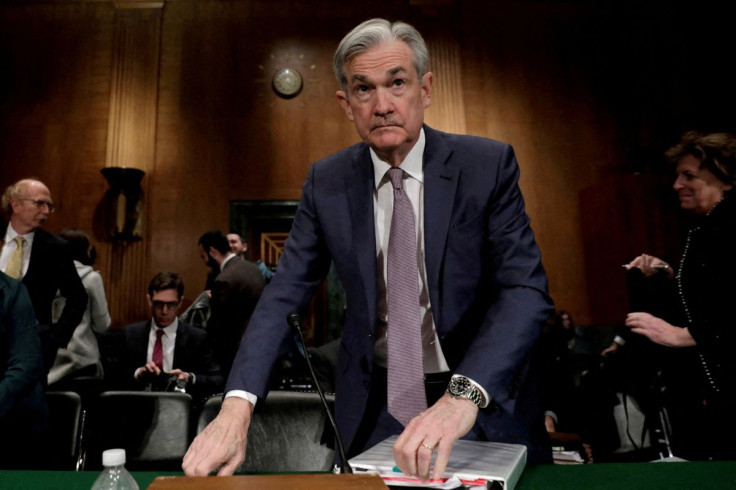Explainer-What's Next For Fed After Senate Vote On Biden's Nominees Delayed

Senate Republicans on Tuesday delayed a pivotal committee vote on President Joe Biden's nominees to the Federal Reserve Board, including Jerome Powell as chair, when they boycotted the proceeding over objections to Sarah Bloom Raskin as the central bank's Wall Street regulator.
Senator Sherrod Brown, an Ohio Democrat who chairs the Banking Committee reviewing the nominations, said he will try to reschedule a vote as soon as possible. It is unclear when that might happen because Republicans, who hold half the seats on the panel, are demanding Raskin be separated from the other four nominees, and Brown is refusing to acquiesce.
Here's how the delay might affect the Fed in the weeks ahead.
WILL IT AFFECT PLANS FOR A MARCH INTEREST RATE HIKE?
Not really.
The Board of Governors earlier this month voted to have Powell act as "chair pro tempore" for the Fed system as a whole until the Senate confirmation process is completed. And in January, he was reelected chair of the Federal Open Market Committee by members of the policy-setting panel.
Officials, including Powell, have signaled their intent to raise interest rates at the March 15-16 meeting, though recent high inflation readings have stirred a public debate about how fast to proceed in the months ahead.
But, for instance, the delay in affirming Fed Governor Lael Brainard's elevation to vice chair - traditionally a leading voice in Fed messaging efforts - may hamper the effort to provide clarity on the road ahead for monetary policy, said Kaleb Nygaard, senior research associate at the Yale Program on Financial Stability.
"This delay in getting the nominees actually hurts the institution's ability to signal because there's an added degree of uncertainty about what the leadership team is going to be," Nygaard said.
WILL THIS MEAN FEWER POLICYMAKER PROJECTIONS NEXT MONTH?
In all likelihood, yes.
Policymakers provide individual forecasts each quarter for where they think inflation, interest rates and the unemployment rate will head in the coming months, and the median of their forecasts on the Fed's target interest rate in particular is very influential. The next set is due at the March meeting.
Since they last provided projections in December, two officials have left the Fed - Richard Clarida and Randal Quarles. With just four weeks until the meeting, it is likely that the next set of projections will include only 16 forecasts instead of 18 in December and 19 were all the nominees confirmed in time.
At the margin that could affect the signal emerging from the projections on how soon officials see inflation returning to their 2% target and how aggressively they intend to raise rates this year and after that.
WHAT'S NEXT IN THE CONFIRMATION PROCESS?
With Republicans refusing to appear, the 12-12 committee cannot reach the quorum required to hold a vote.
For now that leaves Brown and his Democratic colleagues - likely in consultation with the White House - to make a political judgment on whether to split up the vote by breaking out Raskin as Republicans have demanded, or to continue trying to get all five nominees through at once.
Several Republicans on the committee have expressed support for the nominations of Powell for a second term as chair and Brainard as vice chair. A number have also said they would support economists Philip Jefferson of Davidson College and Lisa Cook of Michigan State University for open board seats.
That signals those four could be "reported favorably" for confirmation consideration to the full Senate - if the committee can hold a vote.
But Republicans are united in opposing Raskin over past comments on climate change and have also accused her of inappropriately lobbying on behalf of a firm where she acted as a director.
WHAT HAPPENS IF THE COMMITTEE DOES EVENTUALLY VOTE?
The names of the nominees winning a majority of support from committee members then go to the full Senate for final confirmation.
In the event the committee "fails to report favorably" on any nominee - a likely outcome for Raskin - Senate Majority Leader Chuck Schumer can have the full Senate vote on "discharging" the Senate banking panel from considering the nomination further.
Then, a final confirmation vote could occur after other technical procedures are completed. The process was used last year to move forward on the stalled nomination of Bureau of Consumer Financial Protection Director Rohit Chopra.
One further twist: that vote may also depend on attendance.
President Donald Trump's attempt to get his one-time economic adviser and controversial Fed nominee Judy Shelton confirmed failed in 2020 in part because a couple of Republicans were quarantining due to COVID-19 exposure and could not come to the Senate floor to vote.
Senator Ben Ray Luj?n, a Democrat from New Mexico, suffered a stroke last month and is recovering, putting off the earliest likely confirmation vote on the Fed nominees until March.
© Copyright Thomson Reuters 2024. All rights reserved.




















